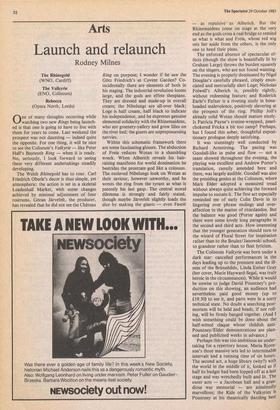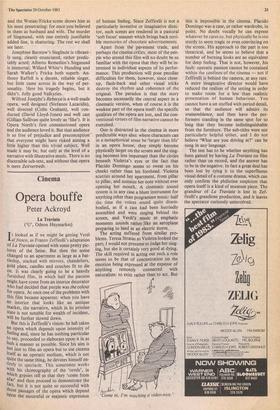Arts
Launch and relaunch
Rodney Milnes
The Rhinegold (WNO, Cardiff) Rebecca (Opera North, Leeds)
One of many thoughts occurring while watching two new Rings being launch- ed is that one is going to have to live with them for years to come. Last weekend the prospect was not daunting — indeed quite the opposite. For one thing, it will be nice to see the Coliseum's Valkyrie — like Peter Hall's Bayreuth Ring — when it is ready. No, seriously, I look forward to seeing these very different undertakings steadily developing.
The Welsh Rhinegold has to tour. Carl Friedrich Oberle's decor is thus simple, yet atmospheric: the action is set in a skeletal Leadenhall Market, with scene changes achieved by minimal adjustment of four rostrums. Gt5ran Jarvefelt, the producer, has revealed that he did not see the Chereau Ring on purpose; I wonder if he saw the Gt5tz Friedrich's at Covent Garden? Co- incidentally there are elements of both in his staging. The industrial revolution looms large, and the gods are effete thespians. They are dressed and made-up in overall cream; the Nibelungs are all-over black; Loge is half cream, half black to indicate his independence, and he expresses genuine elemental solidarity with the Rhinemaidens, who are greenery-yallery and grow lilies on the river bed; the giants are unprepossessing navvies.
Within this schematic framework there are some fascinating glosses. The abduction of Freia reduces Wotan to a shambling wreck. When Alberich reveals his hair- raising manifesto for world domination he bestrides the prostrate god like a colossus. The enslaved Nibelungs look on Wotan as their saviour, however unworthy, and he wrests the ring from the tyrant at what is patently his last gasp. The central moral dilemma is strongly and fairly stated, though maybe Jarvefelt slightly loads the dice by making the giants — even FasoIt — as repulsive as Alberich. But the Rhinemaidens come on stage at the very end as the gods cross a real bridge to remind us what is what and Freia, whose red wig sets her aside from the others, is the only one to heed their pleas.
The enforced absence of spectacular ef- fects (though the show is beautifully lit by Graham Large) throws the burden squarely on the singers, who are not found wanting. The evening is properly dominated by Nigel Douglas's carefully phrased, crisply enun- ciated and mercurially alert Loge; Nicholas Folwell's Alberich is, possibly rightly, without redeeming feature; and Roderick Earle's Fafner is a riveting study in bone- headed malevolence, positively slavering at the prospect of the ring. Phillip Joll's already solid Wotan should mature nicely. Is Patricia Payne's ermine-wrapped, pearl- chokered Fricka a bit too camp? Perhaps, but I found this sober, thoughtful exposi- tionary prologue deeply satisfying.
It was stunningly well conducted by Richard Armstrong. The pacing was Goodall-like in pulse and flow — not a seam showed throughout the evening, the playing was excellent and Andrew Porter's translation, cannily amended here and there, was largely audible. Goodall was also the presiding genius at the Coliseum, where Mark Elder adopted a measured tread without always quite achieving the forward impulse to sustain it. The first act especially reminded me of early Colin Davis in its lingering over phrase endings and over- affection in the matter of ritardandos. But the balance was good (Porter again) and there were some lovely long paragraphs in the second and third acts. How interesting that the younger generation should turn to the wizard of Floral Street for inspiration rather than to the Boulez/Janowski school, to grandeur rather than to fleet lyricism.
The Coliseum Valkyrie was born under a dark star: cancelled performances in the days leading up to the premiere and the ill- ness of the Brannhilde, Linda Esther Gray (her cover, Marie Hayward-Segal, was truly heroic in the circumstances). While it would be unwise to judge David Pountney's pro- duction on this showing, an audience had nevertheless paid good money (up to 19.50) to see it, and parts were in a sorry technical state. No doubt a searching post- mortem will be held and heads, if not roll- ing, will be firmly banged together. (And I wish something could be done about the half-witted claque whose childish anti- Pountney/Elder demonstrations are plan- ned and publicised weeks in advance.)
Perhaps this was too ambitious an under- taking for a repertory house. Maria Bjorn
son's three massive sets led to interminable intervals and a running time of six hours. The second act, a huge library (why?) with the world in the middle of it, looked as if half its budget had been lopped off at a late stage and was wretchedly built and lit. The outer acts — a Jacobean hall and a gran- diose war memorial — are admittedly marvellous; the Ride of the Valkyries IS Pountney at his theatrically dazzling best and the Wotan/Fricka ,scene shows him at his most penetrating: for once you believed in them as husband and wife. The murder of Siegmund, with one entirely justifiable added line, is shattering. The rest we shall see later.
Josephine Barstow's Sieglinde is vibrant- ly sung, cleanly enunciated, rather predic- tably acted; Alberto Remedios's Siegmund is immortal; Willard White's Hunding and Sarah Walker's Fricka both superb. An- thony Raffell is a decent, reliable singer, but little came across in the way of per- sonality. Here his tragedy begins, but it didn't. Jolly good Valkyries.
Wilfred Josephs's Rebecca is a well-made opera, well designed (Stefanos Lazaridis), well directed (Colin Graham), well con- ducted (David Lloyd-Jones) and well cast (Gillian Sullivan quite lovely as `She'). It is Opera North's first commissioned opera and the audience loved it. But that audience is so free of prejudice and preconception • that everyone might have risked aiming a little higher than this trivial subject. Well made it may be, but only at the level of a narrative with illustrative music. There is no discernible sub-text, and without that opera is mere Zeitvertreib.















































 Previous page
Previous page